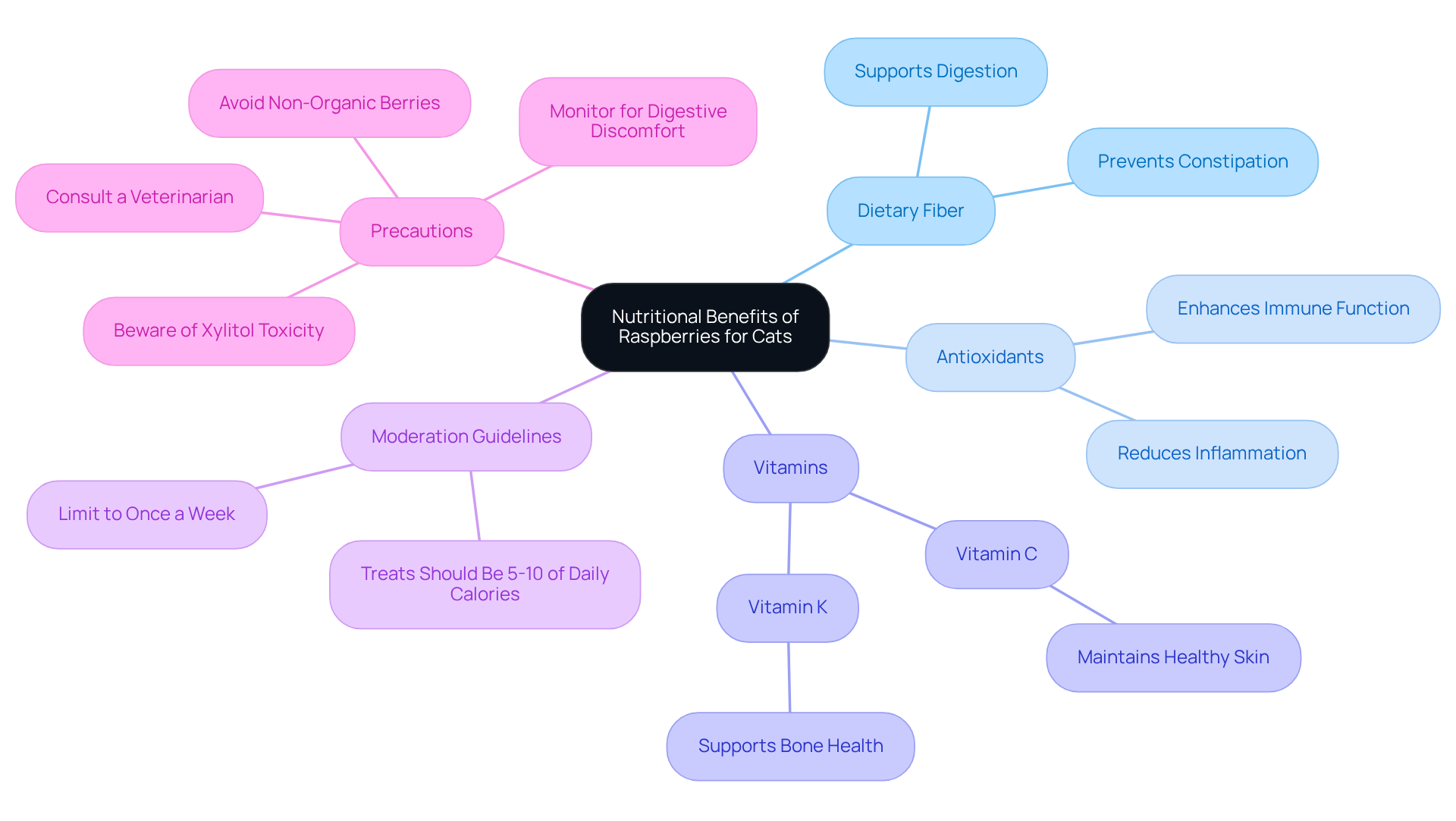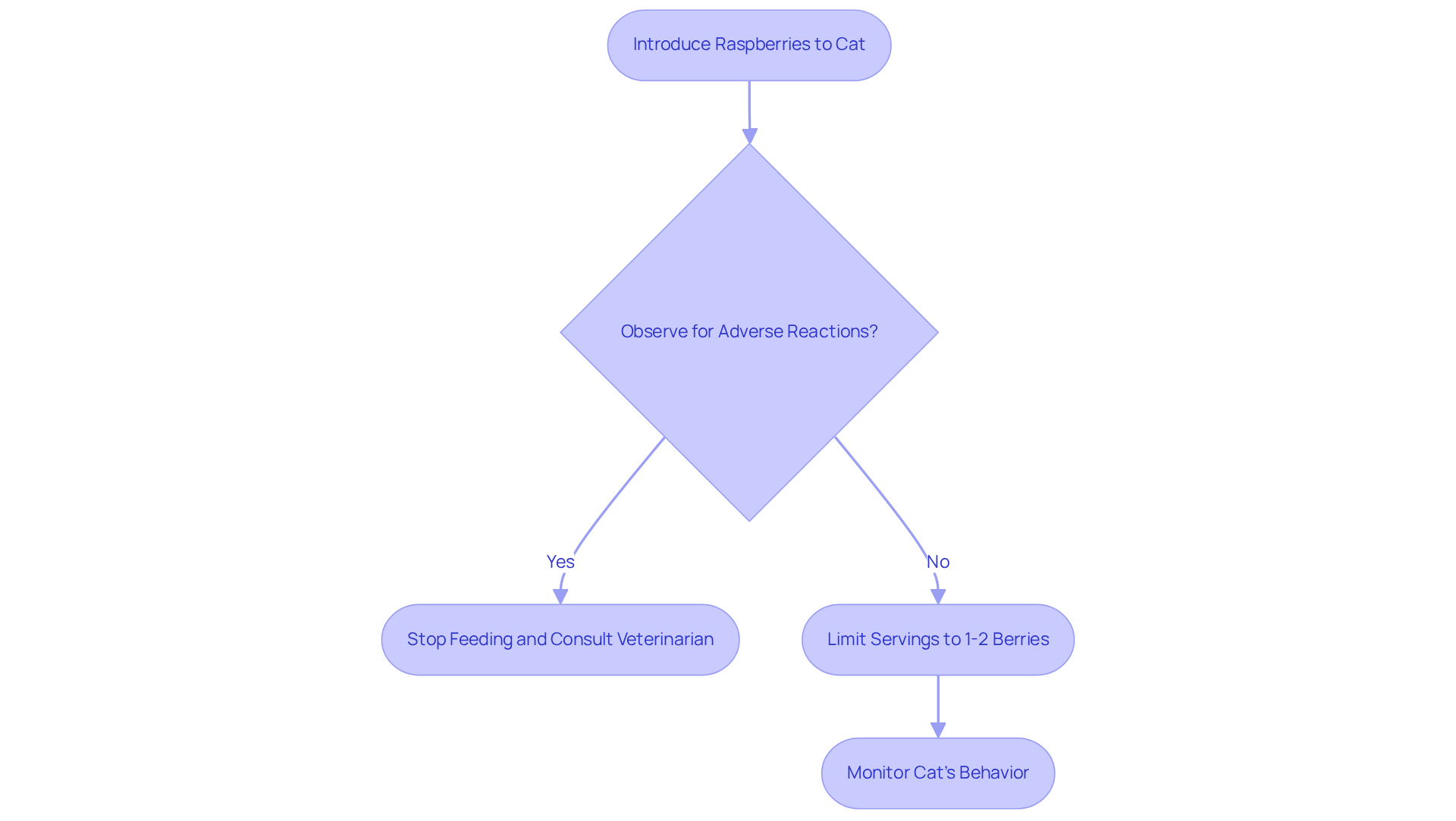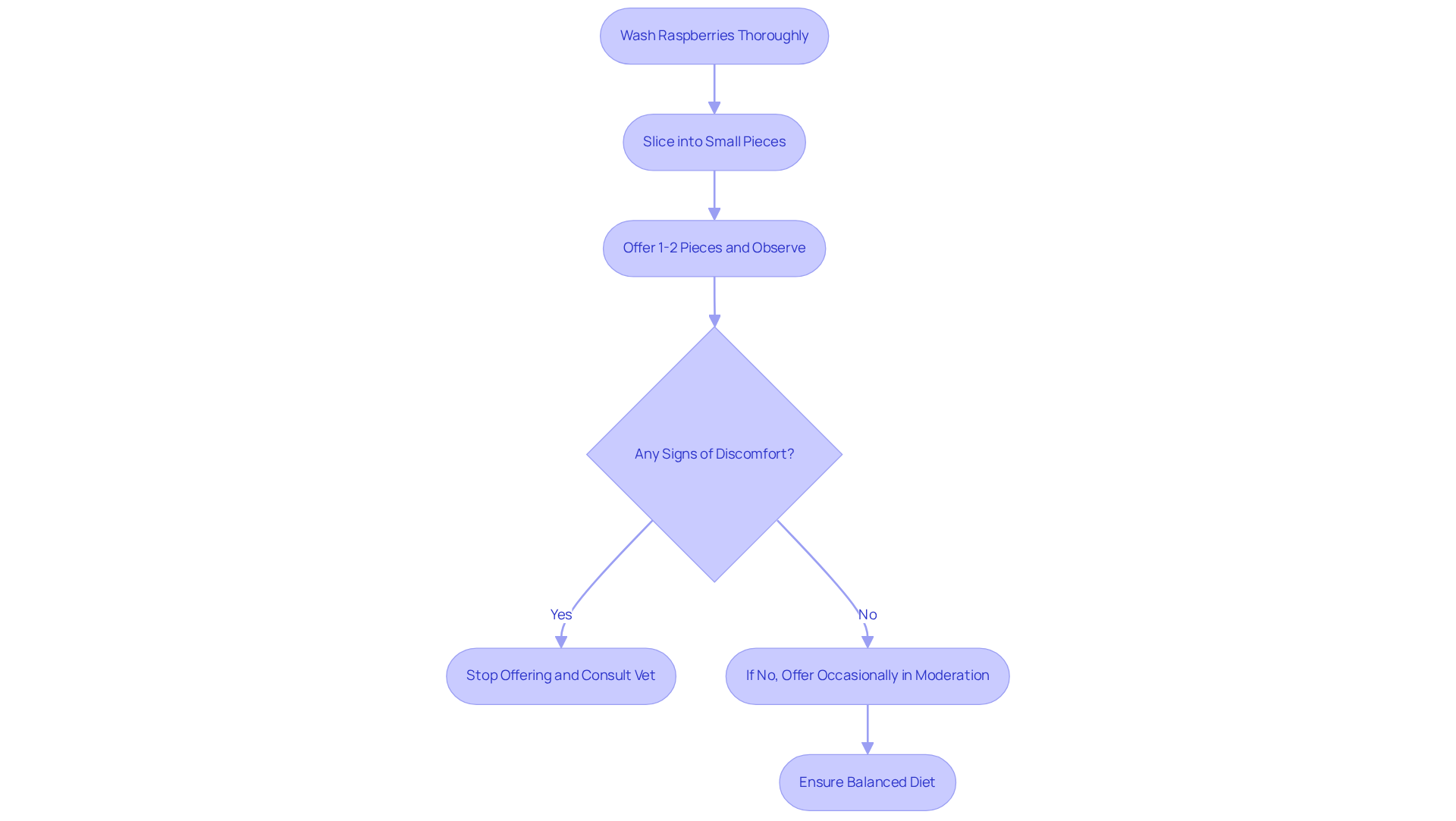
Can Cats Eat Raspberries? Safety, Benefits, and Risks Explained
Overview
As a loving cat owner, you may wonder about the safety of introducing new foods into your furry friend’s diet. It’s comforting to know that cats can enjoy raspberries in moderation. These delightful berries are non-toxic and can provide nutritional benefits, including fiber and antioxidants. However, it’s crucial to approach this new treat with care. Gradually introducing raspberries and closely monitoring your cat for any adverse reactions can help ensure their well-being.
It’s important to remember that while raspberries can be a fun addition, limiting their intake is essential to prevent any digestive issues and to maintain a balanced diet for your beloved pet. By taking these steps, you can make informed choices that contribute positively to your cat’s health. Your dedication to understanding their needs and preferences speaks volumes about the love and care you provide. Always prioritize your pet’s comfort and happiness as you explore new dietary options together.
Introduction
The vibrant raspberry, with its sweet-tart flavor and impressive nutritional profile, has long been celebrated for its health benefits in humans. As caring pet owners, we often seek ways to enhance our feline friends’ diets, and this raises an important question: can our beloved cats safely enjoy this delightful berry?
In this article, we will explore the potential advantages and risks associated with feeding raspberries to our furry companions, offering insights into their nutritional value and the precautions necessary for safe consumption. With so many conflicting opinions on pet diets, it can be overwhelming to determine whether this fruit is a suitable treat for our cherished pets.
Together, let’s navigate this journey of understanding and ensure we make the best choices for their health and happiness.
Define Raspberries: Characteristics and Nutritional Profile
Raspberries (Rubus idaeus) are small, vibrant red fruits from the rose family, cherished for their sweet-tart flavor. These nutrient-dense berries are low in calories, containing about 64 calories and 14.7 grams of carbohydrates per cup, while also offering an impressive 8 grams of dietary fiber. They are rich in vitamins C, K, and E, and feature a variety of antioxidants such as quercetin and ellagic acid, known for their anti-inflammatory properties and immune support. As Cynthia Sass, a licensed nutritionist, beautifully points out, ‘these berries are antioxidant powerhouses due to their high vitamin C content,’ showcasing their significant benefits for overall well-being.
The nutritional advantages of these berries extend beyond human consumption, raising the question of whether can cats eat raspberries, as they can also be beneficial for our beloved pets. The high fiber content aids in digestion, while the antioxidants may help combat oxidative stress, potentially benefiting pets at risk for conditions like obesity or diabetes. A study involving 32 adults revealed that increased berry consumption helped lower blood sugar levels, which could be relevant for pets facing similar risks. Additionally, case studies have shown that the fiber in these berries supports the growth of beneficial gut bacteria, essential for overall health and vitality.
When considering whether can cats eat raspberries, it’s crucial to remember that while berries are generally safe in moderation, some pets may have allergies. Always introduce new foods gradually, keeping a watchful eye for any adverse reactions. Pet owners often consider whether can cats eat raspberries, as they can be a delightful addition to a cat’s diet, providing both flavor and health benefits, making them a wonderful option for enhancing their furry companions’ nutrition. However, it’s important to store fresh raspberries properly in the refrigerator and consume them within one to two days to ensure their quality and safety.

Assess Safety: Are Raspberries Safe for Cats?
Many pet owners wonder, can cats eat raspberries, as they are often considered a safe treat for our beloved felines when offered in moderation. These delightful berries are non-toxic and free from harmful substances, leading to the inquiry of can cats eat raspberries without negatively impacting their health. However, as caring pet owners, it’s crucial to introduce any new food gradually, allowing us to observe for any potential adverse reactions. While many cats can enjoy these berries without issue, it’s important to consider if can cats eat raspberries, as individual sensitivities can vary. Some cats may even turn their noses up at the fruit, a reflection of their natural carnivorous instincts.
As you navigate the world of pet nutrition, always consult with your veterinarian before adding new foods to your cat’s diet. This step not only ensures their safety but also reassures you that you are making the best choices for your furry friend’s well-being. Your cat deserves the best, and together, we can ensure their diet is both safe and enjoyable.

Explore Benefits: Nutritional Advantages of Raspberries for Cats
You may wonder, can cats eat raspberries? They can be a delightful and nutritious treat for your feline friend, offering various benefits that may ease your concerns about their diet. These berries are rich in dietary fiber, which supports digestion and helps prevent constipation, promoting a healthy gut. You can feel good knowing that the antioxidants in raspberries can enhance your cat’s immune function and reduce inflammation, contributing to their overall well-being. Moreover, vitamins C and K found in these berries play essential roles in maintaining healthy skin and bones.
While it’s true that cats thrive on a meat-centered diet, it’s worth considering if can cats eat raspberries in moderation as a refreshing and nutritious addition to their meals. Remember, treats should not exceed 10% of your cat’s total caloric intake, ensuring that their main nutrition comes from a balanced diet. Before introducing any new food, it’s always wise to consult your veterinarian, who can help ensure your furry companion’s safety.
It’s important to be aware that excessive intake of raspberries can lead to digestive discomfort or weight gain, so starting with a small sample is advisable to assess your cat’s tolerance. Additionally, consider that non-organic berries may carry pesticide and herbicide residues, which could be harmful to your pet’s health. While these berries are generally safe, it’s best to offer them no more than once a week, and always be cautious about the potential toxicity of xylitol in large amounts. By being mindful of these factors, you can provide a loving and thoughtful treat for your beloved cat.

Identify Risks: Precautions When Feeding Raspberries to Cats
Raspberries can be a delightful snack for many felines, but it’s essential to ask, can cats eat raspberries, to ensure their well-being. As a caring pet owner, you may worry about the potential gastrointestinal issues that can arise from overfeeding, such as diarrhea or vomiting. The high sugar content in these fruits can also contribute to obesity and diabetes if consumed excessively. To keep your furry friend safe, it’s best to limit their servings to just one or two berries at a time and to watch for any adverse reactions.
Additionally, while raspberries contain only minor levels of xylitol, which can be harmful in larger amounts, it’s crucial to introduce them slowly into your cat’s diet to see if can cats eat raspberries without any issues. Remember to wash the berries thoroughly before serving to eliminate any chemicals that could be harmful. If you notice any signs of distress in your cat, such as vomiting or unusual behavior, please stop giving them berries immediately and consult your veterinarian. Your attentive monitoring of your cat’s response to new foods is key to preventing potential health issues, ensuring that they remain happy and healthy.

Guide Serving: How to Safely Offer Raspberries to Cats
Introducing new foods to your beloved cat can be a source of concern, but with a little care, you can ensure that can cats eat raspberries safely and share the joy of them. Begin by thoroughly washing the fruit to remove any pesticides or contaminants, ensuring that your furry friend is safe. Raspberries, being about 85% water, can be a delightful way to aid in your cat’s hydration, prompting the inquiry of can cats eat raspberries, which is so important for their health.
When preparing the berries, slice them into small, manageable pieces to reduce the risk of choking, particularly for our smaller feline companions. Start with just one or two pieces, and watch your cat closely for any signs of discomfort, such as vomiting or diarrhea. It’s understandable to feel anxious during this process; however, if your cat enjoys the berries without any adverse effects, you might wonder, can cats eat raspberries, and if so, you can offer them as an occasional treat.
Remember, though, that raspberries should never replace a balanced diet. They should only be given in moderation—ideally no more than once or twice a week—and should make up less than 10 percent of your cat’s total intake. This thoughtful approach ensures that your cat can enjoy the benefits of this fruit while minimizing potential health risks, including digestive issues that can arise from high fiber content. Your commitment to their well-being shines through in these small, caring choices.

Conclusion
Raspberries can indeed be a delightful and nutritious treat for our beloved cats, offering a range of health benefits when introduced with care. While these vibrant berries are generally safe and non-toxic, it’s crucial to remember that moderation is key to ensuring they enhance rather than disrupt your cat’s diet. We must understand that cats thrive primarily on a meat-based diet, yet incorporating small amounts of raspberries can provide additional vitamins, antioxidants, and fiber to support their overall health.
Throughout this discussion, we’ve highlighted the safety of feeding raspberries to cats, emphasizing the importance of a gradual introduction and monitoring for any adverse reactions. It’s heartening to note their rich nutritional profile, which can lead to benefits like improved digestion and immune support, while also being mindful of potential risks associated with overconsumption, such as gastrointestinal discomfort and weight gain. By adhering to recommended serving sizes and being attentive to individual sensitivities, you can safely include raspberries in your cat’s diet.
Ultimately, the decision to offer raspberries should stem from your deep commitment to your cat’s well-being and dietary balance. By consulting with a veterinarian and paying close attention to your cat’s reactions, you can make informed choices that promote their health. Embrace the joy of sharing these tasty berries as an occasional treat, contributing positively to your feline friend’s nutrition while ensuring they remain happy and healthy.
